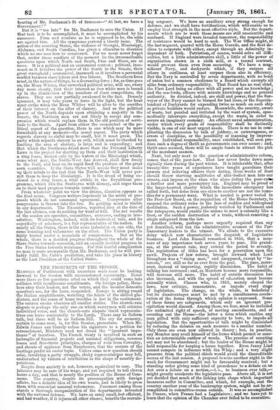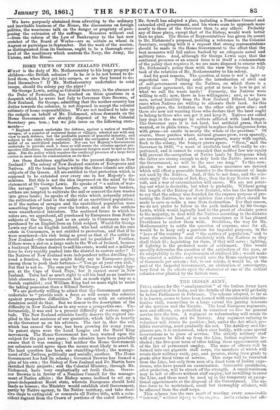THE PROSPECTS OF THE SESSION.
MEMBERS of Parliament with uncertain seats must be looking forward to the Session with unaccustomed equanimity. Never were there so few questions afoot on which they could come into collision with troublesome constituents. On foreign policy, Mem- bers obey their leaders, not the voters, and the broader domestic questions are, for the hour, suspended. Europe is sitting round the Italian amphitheatre, watching the feints of the skilled gla- diators, and the sense of home troubles is lost in the excitement. The cannon smoke obscures all smaller strifes. The church-rate dispute is perhaps the only one on which vestrymen will criticize individual votes, and the church-rate dispute timid representa- tives can leave contentedly to the Lords. There may be Reform talk, but there will be no Reform Bill. The cry for economy, certain to come soon, is, for this Session, premature. When Edwin James can bluntly refuse his signature to a petition for retrenchment, Ministers need not dread the "ignorant impa- tience" of taxation. The French treaty is involved in such an imbroglio of financial projects and national obligations, revenue losses and free-trade principles, charges of ruin from Coventry, and shouts of applause from Manchester, that the orators of the hustings prefer an easier topic. Unless some new question should arise, involving a party struggle, shaky representatiyes may loll, undisturbed by visions of retribution in the shape of country de- putations. Respite from anxiety is not, however, equivalent to ease. The labourer may be sure of his wage, and yet required to toil eleven hours a day, and that is nearly the position of the House of Com- mons. The country, despite its preoccupation with foreign affairs, has a definite idea of its own wants, and is likely to press them with somewhat unusual vehemence. Foremost among these stands a thorough reorganization of the departments intrusted with the national defence. We have an army small, but efficient, and bad weather, if it injures all other classes, benefits the recruit-
ing sergeant. We have an auxiliary army strong enough for defence, and we shall have fortifications, which will enable us to employ that strength in the most effective style. But the depart- ments which are to work these means are still unscientific and confused. If England were invaded tomorrow, the responsibility
of resistance would be hard to seek. The War Office might, at
the last moment, quarrel with the Horse Guards, and the fleet de- cline to cooperate with either, except through an Admiralty in-
dependent of both. Patriotism, of course, would solve all diffi- culties, but a little administrative skill, a little of the power of organization shown in a cloth mill, or a tunnel contract, would prevent them even from occurring. We have a mag- nificent Navy, and dockyards which, if they surpass all others in costliness, at least surpass them also in efficiency. But the Navy is controlled by seven departments, with no bond of union but a common obedience to a Board which exempts all alike from ordinary responsibility. That Board has no real chief, the First Lord being an officer with all power and no knowledge ; and the sea-lords, officers with minute knowledge and no general authority. So divided, indeed, are skill and power, that the Sur- veyor of the Navy cannot be blamed for bad lines, or the Superin- tendent of Dockyards for expending twice as much on each ship as private builders would endure. Meanwhile, the country, aware of waste, but puzzled and irritated by the want of system, spas- modically interrupts everything, except the waste, in order to secure an imaginary economy. An efficient naval administration, under which every grade of responsibility shall be distinctly visible, is one of our most urgent needs. There is no use in com- plicating the discussion by talk of jobbery, or extravagance, or errors of discipline, or the possibility of manning by -impress- ment. Individual responsibility, once established, will soon pro- duce such a degree of thrift as governments can ever secure ; and, thrift once secured, there will be ample funds to attract the pick of the merchant seamen.
Next, but only next to the question of administrative reform, comes that of the poor-law. That law never broke down more signally than during the past winter. It is intolerable that, after twenty-five years of experience have taught guardians their powers and relieving officers their duties, three weeks of frost should throw starving multitudes of able-bodied men into our streets, and impose on the class who alone defray the poor-rake a further and more peremptory tax. England may be proud of the large-hearted charity which the immediate emergency has called forth, but doles from one class to another are not the reme- dies for a permanent want. What is needed is power vested in the Poor-law Board, on the requisition of the Home Secretary, to suspend the ordinary rules in the face of sudden and widespread destitution. Such a power, jealously watched by Parliament and the ratepayers, would enable the unions to meet a calamity like a frost, or the sudden destruction of a trade, withoutremoving a single safeguard from the law.
Another reform, perhaps more urgently required than any yet described, will tax the administrative acumen of the Par- liamentary leaders to the utmost. We allude to the excessive delay which now characterizes the despatch of Legislative business. Lord John Russell remarked in 1855, that a mea- sure of any importance took seven years to pass. His grand- son, at the present rate, may extend the period to seventy. The registration of titles has been for a generation upon the anvil. Projects of law reform, brought forward when Lord Brougham was a "rising man," and unopposed, except by "in- terests," are still as far as ever from the goal. The pace, more- over, instead of improving, rapidly diminishes. The habit of talking has increased; and, as Members become more responsible, will increase still more. The habit of outside discussion has also increased, and with the spread of education must become annually wider. Classes who, in 1815, merely obeyed the laws, now criticize, remonstrate, or impede every stage of legislation. The change, on the whole, is beneficial ; but its disadvantages must be met by a simultaneous accele- ration of the forms through which opinion is expressed. Some of these forms are safeguards, which only an ignorant pre- cipitation would discard. Among these, we fear, must be included the unlimited right of speech, of moving amendments, and of counting out the House—the latter a form which enables any man gifted with only sufficient capacity to bore, to impede all legislation. But the opportunities of talk might be diminished by reducing the debates on each measure to a smaller number. Only three are even now allowed in theory ; but, in practice, any Member may avail himself of the forms which permit or sanc- tion an interminable outflow of words. The practice of counting out may not be abandoned ; but the leader of the House might be held responsible for keeping a house together. Even Jenny Lind cannot compete in influence with the Whip ; and a very slight pressure from the political chiefs would avoid the discreditable scenes of the last session. A proposal to seize another night in the week for Government might not be favourably received ; but a standing order giving some kind of precedence to a debate on an Act over a debate on a motion,—i. e., to business over talk,— might greatly aocelerate the legislative pace. Above all, it is not yet decided that much of the licking into shape which important measures suffer in Committee, and which, for example, cost the country another year of the bankruptcy system, might not be ac- complished in committee-rooms outside. It was so accomplished in France' when France had a Legislature ; and we have yet to learn that the opinion of the Chamber ever failed to be executive.
We have purposely abstained from adverting to the ordinary and inevitable business of the House, the discussions on foreign politics, the wearisome talk on the danger or propriety of post- poning the extension of the suffrage. Measures without end —from the reform of the Law of Bankruptcy to the last new crotchet of the Board of Works—are as certain as wheat in A t or partridges in September. But the work of the session, as distinguished from its business, ought to be a thorough over- haul of the machinery which controls the Navy, the Army, the Unions, and the House.



























 Previous page
Previous page